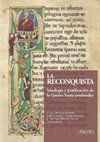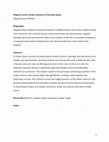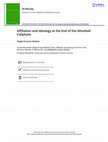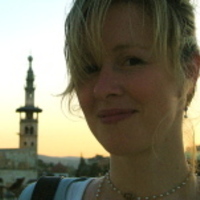Books by Abigail K Balbale

Cornell University Press, 2022
The Wolf King explores how political power was conceptualized, constructed, and wielded in twelft... more The Wolf King explores how political power was conceptualized, constructed, and wielded in twelfth-century al-Andalus, focusing on the eventful reign of Muhammad ibn Sad ibn Ahmad ibn Mardanīsh (r. 1147–1172). Celebrated in Castilian and Latin sources as el rey lobo/rex lupus and denigrated by Almohad and later Arabic sources as irreligious and disloyal to fellow Muslims because he fought the Almohads and served as vassal to the Castilians, Ibn Mardanīsh ruled a kingdom that at its peak constituted nearly half of al-Andalus and served as an important buffer between the Almohads and the Christian kingdoms of Castile and Aragon.
Through a close examination of contemporary sources across the region, Abigail Krasner Balbale shows that Ibn Mardanīsh's short-lived dynasty was actually an attempt to integrate al-Andalus more closely with the Islamic East—particularly the Abbasid caliphate. At stake in his battles against the Almohads was the very idea of the caliphate in this period, as well as who could define righteous religious authority. The Wolf King makes effective use of chronicles, chancery documents, poetry, architecture, coinage, and artifacts to uncover how Ibn Mardanīsh adapted language and cultural forms from around the Islamic world to assert and consolidate power—and then tracks how these strategies, and the memory of Ibn Mardanīsh more generally, influenced expressions of kingship in subsequent periods.

La Ergástula Ediciones, 2019
Few historical terms have aroused as much controversy in Spain as that of "la reconquista". Since... more Few historical terms have aroused as much controversy in Spain as that of "la reconquista". Since the 1980s, historians have hover between the relevance of its use and its absolute rejection. The debate continues still today among those who think that “reconquista" is a useful term to define an ideological construction of the past, and those who believe it should better be discarded once and for all. For this reason, and within the framework of our research project Confrontatio, which focuses on Religious Violence in the Peninsular Middle Ages: War, Apologetic Discourse and Historiographic Narrative (ss. X-XV) [HAR2016-74968-P], we have aimed to tackle the question in an attempt to provide ideas and new reflections from a wide variety of angles and perspectives, which may contribute, as far as possible, to clarifying the discussion.
Hay pocos términos históricos que hayan suscitado tanta polémica en España como el de la “reconquista”. Los historiadores desde la década de los ochenta del pasado siglo se debaten entre la pertinencia de su uso o su absoluta descalificación. El debate continúa hoy entre quienes piensan que la “reconquista” es útil para definir una construcción ideológica del pasado, y quienes creen que es mejor descartar el término definitivamente. Por ello, desde nuestro proyecto de investigación Confrontatio centrado en la Violencia religiosa en la Edad Media peninsular: guerra, discurso apologético y relato historiográfico (ss. X-XV) [HAR2016-74968-P], hemos querido abordar la cuestión procurando aportar ideas y nuevas reflexiones, desde ángulos y perspectivas muy variadas, que permitan contribuir, en la medida de lo posible, a clarificar el debate.

This book presents an in-depth exploration of the administration of justice during Islam’s foundi... more This book presents an in-depth exploration of the administration of justice during Islam’s founding period, 632–1250 CE. Inspired by the scholarship of Roy Parviz Mottahedeh and composed in his honor, this volume brings together ten leading scholars of Islamic law to examine the history of early Islamic courts. This approach draws attention to both how and why the courts and the people associated with them functioned in early Islamic societies: When a dispute occurred, what happened in the courts? How did judges conceive of justice and their role in it? When and how did they give attention to politics and procedure?
Each author draws on diverse sources that illuminate a broader and deeper vision of law and society than traditional legal literature alone can provide, including historical chronicles, biographical dictionaries, legal canons, exegetical works, and mirrors for princes. Altogether, the volume offers both a substantive intervention on early Islamic courts and on methods for studying legal history as social history. It illuminates the varied and dynamic legal landscapes stretching across early Islam, and maps new approaches to interdisciplinary legal history.

Spanning the Strait: Studies in Unity in the Western Mediterranean brings together a multidiscipl... more Spanning the Strait: Studies in Unity in the Western Mediterranean brings together a multidisciplinary collection of essays that examines the deep connections that bound together the Iberian Peninsula and the Maghrib in the medieval and early modern periods. Six articles on topics ranging from the eighth-century slave trade to sixteenth-century apocalypticism trace and analyze movement, mutual influence and patterns shared in the face of political, religious, and cultural difference.
By transcending traditional disciplinary and temporal divisions, this collection of essays highlights the long history of contact and exchange that united the two sides of the Strait of Gibraltar. A comprehensive introduction by the editors contextualizes the articles within the last half-century of scholarship and salient contemporary trends.
Contributors are Adam Gaiser, Linda G. Jones, Hussein Fancy, S.J. Pearce, David Coleman, and Marya T. Green-Mercado.

Yale University Press, 2008
Named a Book of the Year by the Times Literary Supplement, this lavishly illustrated work expl... more Named a Book of the Year by the Times Literary Supplement, this lavishly illustrated work explores the vibrant interaction among different and sometimes opposing cultures, and how their contacts with one another transformed them all. It chronicles the tumultuous history of Castile in the wake of the Christian capture of the Islamic city of Tulaytula, now Toledo, in the eleventh century and traces the development of Castilian culture as it was forged in the new intimacy of Christians with the Muslims and Jews they had overcome.
The authors paint a portrait of the culture through its arts, architecture, poetry and prose, uniquely combining literary and visual arts. Concentrating on the eleventh and twelfth centuries, the book reveals the extent to which Castilian identity is deeply rooted in the experience of confrontation, interaction, and at times union with Hebrew and Arabic cultures during the first centuries of its creation. Abundantly illustrated, the volume serves as a splendid souvenir of southern Spain; beautifully written, it illuminates a culture deeply enriched by others.
Papers by Abigail K Balbale

Religious Materiality in the Early Modern World, 2019
This is the pre-print version of a book chapter published as “Magical words: Arabic amulets in Ch... more This is the pre-print version of a book chapter published as “Magical words: Arabic amulets in Christian Spain,” in Suzanna Ivanic, Mary Laven and Andrew Morall, eds., Religious Materiality in the Early Modern World, (Amsterdam University Press, 2019), pp. 211-228.
In Islamic Spain, amulets incorporating the names of God or passages from the Quran were widely used, inserted into cases that could be worn around the neck or built into the walls of houses, and were seen as offering protection to their users. In the years after the Christian conquest, Moriscos continued using such amulets even as the Inquisition outlawed such practices. This chapter explores the apotropaic and theurgic qualities of the Arabic word in early modern Spain through Morisco writings, extant amulets and Inquisition records. This evidence reveals the magical potency of the Arabic word not only for those who produced and used these amulets, but also for those who prosecuted them. In Early Modern Spain, as in Islamic territories, Arabic was imbued with otherworldly power.

In the seventh/thirteenth century, as the Almohad dynasty's power waned and expansive Christian k... more In the seventh/thirteenth century, as the Almohad dynasty's power waned and expansive Christian kingdoms claimed new territories, many Muslim rulers sought to claim power in al-Andalus. Although chronicles in Arabic and Latin alike present this time as one of holy war, a closer examination of the relations among Almohad governors and caliphs and independent Andalusi rulers shows a vital conflict over what constituted righteous authority. Many claimants to power allied with Christians against Muslim rivals. This article focuses on two rulers: the Almohad governor of Valencia, Abū Zayd, who eventually converted to Christianity and ended his life as an Aragonese nobleman, and Zayyān ibn Mardanīsh, an Andalusī warrior who fought Abū Zayd and briefly ruled Valencia before eventually fleeing to Ḥafṣid Tunisia. These two figures' campaigns for power, and their complex trajectories within and outside al-Andalus, highlight the interconnected nature of the Western Mediterranean, and the importance of ideology in constructing power. They also destabilize visions of Berber fundamentalism and Andalusī tolerance so prevalent in the historiography.
A Companion to Islamic Art and Architecture, ed. Gulru Necipoglu & Finbarr Barry Flood, 2017
The Articulation of Power in Medieval Iberia and the Maghrib, Ed. Amira Bennison, 2014
has been seen as unorthodox rather than reflective of the flexibility of political and religious ... more has been seen as unorthodox rather than reflective of the flexibility of political and religious practice in the broader Islamic world.

Journal of Medieval Iberian Studies, 2013
This essay explores María Rosa Menocal’s approach to the culture of medieval Iberia. It focuses p... more This essay explores María Rosa Menocal’s approach to the culture of medieval Iberia. It focuses particularly on her interest in the cacophonous, or competing and sometimes contradictory voices that lay at the heart of much literature as well as other cultural forms. Her scholarship explored this multiplicity of voices in poetry like the muwashshah.a, as well as in individual figures who sometimes embraced the culture of the enemy even as they advocated holy war against them. By highlighting these complex forms and figures, María sought to problematize proto-nationalist narratives of Iberian history while also demonstrating the “modernity” of the medieval world. This essay addresses how medieval Iberia has shifted, in both academic and popular perception, since the 1980s when Menocal began writing, and argues that her legacy can best be carried forward by extending her emphasis on the multivalent and cacophonous beyond the Iberian Peninsula and the medieval period.
Medieval Encounters 19, 2013
Book Reviews by Abigail K Balbale
Speculum, 2022
Review of Mercedes García-Arenal and Gerard Wiegers, eds., Polemical Encounters: Christians, Jews... more Review of Mercedes García-Arenal and Gerard Wiegers, eds., Polemical Encounters: Christians, Jews, and Muslims in Iberia and Beyond. (Iberian Encounter and Exchange, 475–1755.) University Park: Pennsylvania State University Press, 2019. Pp. x, 430; black-and-white figures. $149.95. ISBN: 978-0-2710-8121-2. Table of contents available online at https://www.psupress.org/books/titles/978-0-271-08121-2.html.
Speculum: Vol 97, No 1
Al-ʿUṣūr al-Wusṭā 30 , Nov 2022
Book Review of Javier Albarrán Iruela, Ejércitos benditos: Yihad y memoria en al-Andalus (siglos... more Book Review of Javier Albarrán Iruela, Ejércitos benditos: Yihad y memoria en al-Andalus (siglos X-XIII). Colección Historia (Granada: Editorial Universidad de Granada, 2020). ISBN 9788433867537. 538 pp. €35.00 paper.
Journal of the Society of Architectural Historians, Vol. 80, 2021
Talks by Abigail K Balbale
Aga Khan Program for Islamic Architecture Lecture Series - click on this link (http://goo.gl/jAVw... more Aga Khan Program for Islamic Architecture Lecture Series - click on this link (http://goo.gl/jAVwCF) to view the video of the talk.
Contribution to the symposium "The Material Text in Pre-Modern and Early Modern Europe," Bard Gra... more Contribution to the symposium "The Material Text in Pre-Modern and Early Modern Europe," Bard Graduate Center, March 5, 2014.
Conference Presentations by Abigail K Balbale

Las presentes jornadas de carácter
internacional recogen el resultado de
la investigación del seg... more Las presentes jornadas de carácter
internacional recogen el resultado de
la investigación del segundo año de
ejecución del proyecto I+D Violencia religiosa
en la Edad Media peninsular: guerra,
discurso apologético y relato historiográfico
(ss. X-XV) HAR2016-74968-P. La
investigación se ha centrado en la relación
de memoria histórica e historiografía, y
es que hoy día está fuera de toda duda la
importancia que tiene la perpetuación de la
memoria – creada y recreada en los sucesivos
momentos de evolución cultural - como
marco de intelección historiográfica. Nuestro
análisis se centra en la idea y concepto de
Reconquista. Estamos, sin duda, ante uno de
los constructos más operativos de cuantos
han animado, en el solar peninsular, la
confrontación entre cristianos y musulmanes.
Intentaremos clarificar perspectivas y
fundamentar hipótesis en relación con un
tema tan manido como necesitado de una
seria valoración historiográfica que permita
resituarlo en el lugar que le corresponde
como muy efectivo discurso justificador. Y
en este sentido, tendremos muy presente
las dos tradiciones, cristiana e islámica, en
confrontación, analizando las respectivas
estrategias ideológicas en torno a la narrativa reconquistadora.
Conferences by Abigail K Balbale
10AM-el taller Reads Together Ana Laguna (Rutgers) discusses her book, Cervantes, the Golden Age,... more 10AM-el taller Reads Together Ana Laguna (Rutgers) discusses her book, Cervantes, the Golden Age, and the Battle for Cultural Identity in 20th-Century Spain (Bloomsbury, 2021), in conversation with Nick Jones (Yale) and Christina Lee (Princeton). Chaired by Jordana Mendelson (NYU). A Password-protected digital copy is available available on our website. 1PM-Graduate Student Research Showcase Open call for graduate student research roundtable with feedback provided by New York-area faculty. Enrollment will be limited to four students on a first-come, first-served basis and preference will be given to New York-based students.











Uploads
Books by Abigail K Balbale
Through a close examination of contemporary sources across the region, Abigail Krasner Balbale shows that Ibn Mardanīsh's short-lived dynasty was actually an attempt to integrate al-Andalus more closely with the Islamic East—particularly the Abbasid caliphate. At stake in his battles against the Almohads was the very idea of the caliphate in this period, as well as who could define righteous religious authority. The Wolf King makes effective use of chronicles, chancery documents, poetry, architecture, coinage, and artifacts to uncover how Ibn Mardanīsh adapted language and cultural forms from around the Islamic world to assert and consolidate power—and then tracks how these strategies, and the memory of Ibn Mardanīsh more generally, influenced expressions of kingship in subsequent periods.
Hay pocos términos históricos que hayan suscitado tanta polémica en España como el de la “reconquista”. Los historiadores desde la década de los ochenta del pasado siglo se debaten entre la pertinencia de su uso o su absoluta descalificación. El debate continúa hoy entre quienes piensan que la “reconquista” es útil para definir una construcción ideológica del pasado, y quienes creen que es mejor descartar el término definitivamente. Por ello, desde nuestro proyecto de investigación Confrontatio centrado en la Violencia religiosa en la Edad Media peninsular: guerra, discurso apologético y relato historiográfico (ss. X-XV) [HAR2016-74968-P], hemos querido abordar la cuestión procurando aportar ideas y nuevas reflexiones, desde ángulos y perspectivas muy variadas, que permitan contribuir, en la medida de lo posible, a clarificar el debate.
Each author draws on diverse sources that illuminate a broader and deeper vision of law and society than traditional legal literature alone can provide, including historical chronicles, biographical dictionaries, legal canons, exegetical works, and mirrors for princes. Altogether, the volume offers both a substantive intervention on early Islamic courts and on methods for studying legal history as social history. It illuminates the varied and dynamic legal landscapes stretching across early Islam, and maps new approaches to interdisciplinary legal history.
By transcending traditional disciplinary and temporal divisions, this collection of essays highlights the long history of contact and exchange that united the two sides of the Strait of Gibraltar. A comprehensive introduction by the editors contextualizes the articles within the last half-century of scholarship and salient contemporary trends.
Contributors are Adam Gaiser, Linda G. Jones, Hussein Fancy, S.J. Pearce, David Coleman, and Marya T. Green-Mercado.
The authors paint a portrait of the culture through its arts, architecture, poetry and prose, uniquely combining literary and visual arts. Concentrating on the eleventh and twelfth centuries, the book reveals the extent to which Castilian identity is deeply rooted in the experience of confrontation, interaction, and at times union with Hebrew and Arabic cultures during the first centuries of its creation. Abundantly illustrated, the volume serves as a splendid souvenir of southern Spain; beautifully written, it illuminates a culture deeply enriched by others.
Papers by Abigail K Balbale
In Islamic Spain, amulets incorporating the names of God or passages from the Quran were widely used, inserted into cases that could be worn around the neck or built into the walls of houses, and were seen as offering protection to their users. In the years after the Christian conquest, Moriscos continued using such amulets even as the Inquisition outlawed such practices. This chapter explores the apotropaic and theurgic qualities of the Arabic word in early modern Spain through Morisco writings, extant amulets and Inquisition records. This evidence reveals the magical potency of the Arabic word not only for those who produced and used these amulets, but also for those who prosecuted them. In Early Modern Spain, as in Islamic territories, Arabic was imbued with otherworldly power.
Book Reviews by Abigail K Balbale
Speculum: Vol 97, No 1
Talks by Abigail K Balbale
Conference Presentations by Abigail K Balbale
internacional recogen el resultado de
la investigación del segundo año de
ejecución del proyecto I+D Violencia religiosa
en la Edad Media peninsular: guerra,
discurso apologético y relato historiográfico
(ss. X-XV) HAR2016-74968-P. La
investigación se ha centrado en la relación
de memoria histórica e historiografía, y
es que hoy día está fuera de toda duda la
importancia que tiene la perpetuación de la
memoria – creada y recreada en los sucesivos
momentos de evolución cultural - como
marco de intelección historiográfica. Nuestro
análisis se centra en la idea y concepto de
Reconquista. Estamos, sin duda, ante uno de
los constructos más operativos de cuantos
han animado, en el solar peninsular, la
confrontación entre cristianos y musulmanes.
Intentaremos clarificar perspectivas y
fundamentar hipótesis en relación con un
tema tan manido como necesitado de una
seria valoración historiográfica que permita
resituarlo en el lugar que le corresponde
como muy efectivo discurso justificador. Y
en este sentido, tendremos muy presente
las dos tradiciones, cristiana e islámica, en
confrontación, analizando las respectivas
estrategias ideológicas en torno a la narrativa reconquistadora.
Conferences by Abigail K Balbale
Through a close examination of contemporary sources across the region, Abigail Krasner Balbale shows that Ibn Mardanīsh's short-lived dynasty was actually an attempt to integrate al-Andalus more closely with the Islamic East—particularly the Abbasid caliphate. At stake in his battles against the Almohads was the very idea of the caliphate in this period, as well as who could define righteous religious authority. The Wolf King makes effective use of chronicles, chancery documents, poetry, architecture, coinage, and artifacts to uncover how Ibn Mardanīsh adapted language and cultural forms from around the Islamic world to assert and consolidate power—and then tracks how these strategies, and the memory of Ibn Mardanīsh more generally, influenced expressions of kingship in subsequent periods.
Hay pocos términos históricos que hayan suscitado tanta polémica en España como el de la “reconquista”. Los historiadores desde la década de los ochenta del pasado siglo se debaten entre la pertinencia de su uso o su absoluta descalificación. El debate continúa hoy entre quienes piensan que la “reconquista” es útil para definir una construcción ideológica del pasado, y quienes creen que es mejor descartar el término definitivamente. Por ello, desde nuestro proyecto de investigación Confrontatio centrado en la Violencia religiosa en la Edad Media peninsular: guerra, discurso apologético y relato historiográfico (ss. X-XV) [HAR2016-74968-P], hemos querido abordar la cuestión procurando aportar ideas y nuevas reflexiones, desde ángulos y perspectivas muy variadas, que permitan contribuir, en la medida de lo posible, a clarificar el debate.
Each author draws on diverse sources that illuminate a broader and deeper vision of law and society than traditional legal literature alone can provide, including historical chronicles, biographical dictionaries, legal canons, exegetical works, and mirrors for princes. Altogether, the volume offers both a substantive intervention on early Islamic courts and on methods for studying legal history as social history. It illuminates the varied and dynamic legal landscapes stretching across early Islam, and maps new approaches to interdisciplinary legal history.
By transcending traditional disciplinary and temporal divisions, this collection of essays highlights the long history of contact and exchange that united the two sides of the Strait of Gibraltar. A comprehensive introduction by the editors contextualizes the articles within the last half-century of scholarship and salient contemporary trends.
Contributors are Adam Gaiser, Linda G. Jones, Hussein Fancy, S.J. Pearce, David Coleman, and Marya T. Green-Mercado.
The authors paint a portrait of the culture through its arts, architecture, poetry and prose, uniquely combining literary and visual arts. Concentrating on the eleventh and twelfth centuries, the book reveals the extent to which Castilian identity is deeply rooted in the experience of confrontation, interaction, and at times union with Hebrew and Arabic cultures during the first centuries of its creation. Abundantly illustrated, the volume serves as a splendid souvenir of southern Spain; beautifully written, it illuminates a culture deeply enriched by others.
In Islamic Spain, amulets incorporating the names of God or passages from the Quran were widely used, inserted into cases that could be worn around the neck or built into the walls of houses, and were seen as offering protection to their users. In the years after the Christian conquest, Moriscos continued using such amulets even as the Inquisition outlawed such practices. This chapter explores the apotropaic and theurgic qualities of the Arabic word in early modern Spain through Morisco writings, extant amulets and Inquisition records. This evidence reveals the magical potency of the Arabic word not only for those who produced and used these amulets, but also for those who prosecuted them. In Early Modern Spain, as in Islamic territories, Arabic was imbued with otherworldly power.
Speculum: Vol 97, No 1
internacional recogen el resultado de
la investigación del segundo año de
ejecución del proyecto I+D Violencia religiosa
en la Edad Media peninsular: guerra,
discurso apologético y relato historiográfico
(ss. X-XV) HAR2016-74968-P. La
investigación se ha centrado en la relación
de memoria histórica e historiografía, y
es que hoy día está fuera de toda duda la
importancia que tiene la perpetuación de la
memoria – creada y recreada en los sucesivos
momentos de evolución cultural - como
marco de intelección historiográfica. Nuestro
análisis se centra en la idea y concepto de
Reconquista. Estamos, sin duda, ante uno de
los constructos más operativos de cuantos
han animado, en el solar peninsular, la
confrontación entre cristianos y musulmanes.
Intentaremos clarificar perspectivas y
fundamentar hipótesis en relación con un
tema tan manido como necesitado de una
seria valoración historiográfica que permita
resituarlo en el lugar que le corresponde
como muy efectivo discurso justificador. Y
en este sentido, tendremos muy presente
las dos tradiciones, cristiana e islámica, en
confrontación, analizando las respectivas
estrategias ideológicas en torno a la narrativa reconquistadora.